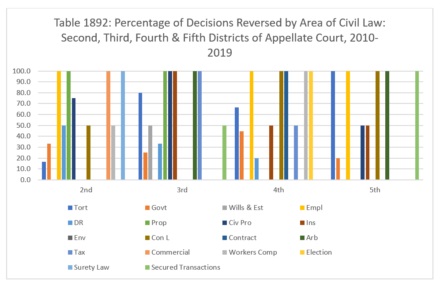Today, we're completing our trip through the reversal rates for the Districts of the Appellate Court, divided by areas of civil law. For this final post, we're looking at the Second, Third, Fourth and Fifth Districts for the years 2010 through 2019.
The overall reversal rate for these districts was 100% in employment law, property law, contract, arbitration and surety law cases. Three-quarters of tax decisions were reversed. The rate was two-thirds in workers compensation and secured transactions cases and 62.5% in constitutional law decisions. The reversal rate for tort cases was 61.1%. Half of all decisions were reversed in wills and estates, civil procedure, insurance, commercial law and election law. The reversal rate for government and administrative cases and domestic relations cases was 33.3%. The reversal rate for environmental law was 0%.
The Fourth and Fifth Districts had 100% reversal rates in constitutional law. The rate for the Second District was 50% and the rate for the Third District was zero. The reversal rate for tort cases from the Fifth District was 100%. The rate for the Third District was 80%. The rate for the Fourth was 66.7%. Only 16.7% of tort decisions from the Second District were reversed. Reversal rates for civil procedure cases were all over the map – 100% for the Third District, 75% for the Second, 50% for the Fifth District and zero for the Fourth. For insurance law cases, the Third District reversal rate was 100%. The rate for the Fourth and Fifth Districts was 50%, and the rate for the Second District was zero. For government and administrative law cases, reversal rates were uniformly low: 44.4% in the Fourth District, 33.3% for the Second, 25% for the Third and 20% for the Fifth. For domestic relations cases, the reversal rate for Second District cases was 50%. The rate for the Third District was 33.3% and the rate for Fourth District cases was 20%.

Join us back here next time as we begin working on a new topic.
Image courtesy of Flickr by Matt Turner (no changes).
The content of this article is intended to provide a general guide to the subject matter. Specialist advice should be sought about your specific circumstances.
